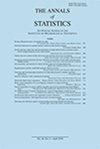Universality of regularized regression estimators in high dimensions
IF 3.2
1区 数学
Q1 STATISTICS & PROBABILITY
引用次数: 0
Abstract
The Convex Gaussian Min–Max Theorem (CGMT) has emerged as a prominent theoretical tool for analyzing the precise stochastic behavior of various statistical estimators in the so-called high-dimensional proportional regime, where the sample size and the signal dimension are of the same order. However, a well-recognized limitation of the existing CGMT machinery rests in its stringent requirement on the exact Gaussianity of the design matrix, therefore rendering the obtained precise high-dimensional asymptotics, largely a specific Gaussian theory in various important statistical models. This paper provides a structural universality framework for a broad class of regularized regression estimators that is particularly compatible with the CGMT machinery. Here, universality means that if a “structure” is satisfied by the regression estimator μˆG for a standard Gaussian design G, then it will also be satisfied by μˆA for a general non-Gaussian design A with independent entries. In particular, we show that with a good enough ℓ∞ bound for the regression estimator μˆA, any “structural property” that can be detected via the CGMT for μˆG also holds for μˆA under a general design A with independent entries. As a proof of concept, we demonstrate our new universality framework in three key examples of regularized regression estimators: the Ridge, Lasso and regularized robust regression estimators, where new universality properties of risk asymptotics and/or distributions of regression estimators and other related quantities are proved. As a major statistical implication of the Lasso universality results, we validate inference procedures using the degrees-of-freedom adjusted debiased Lasso under general design and error distributions. We also provide a counterexample, showing that universality properties for regularized regression estimators do not extend to general isotropic designs. The proof of our universality results relies on new comparison inequalities for the optimum of a broad class of cost functions and Gordon’s max–min (or min–max) costs, over arbitrary structure sets subject to ℓ∞ constraints. These results may be of independent interest and broader applicability.高维正则回归估计量的通用性
凸高斯最小-最大定理(cggmt)已经成为一个重要的理论工具,用于分析所谓的高维比例状态下各种统计估计器的精确随机行为,其中样本大小和信号维数是同一阶的。然而,现有的cggmt机制的一个公认的局限性在于其对设计矩阵的精确高斯性的严格要求,因此使得所获得的精确高维渐近性,在很大程度上是各种重要统计模型中的特定高斯理论。本文为广义的正则化回归估计提供了一个结构通用性框架,它与cggmt机制特别兼容。这里,通用性意味着如果一个“结构”对于标准高斯设计G被回归估计量μ μ G所满足,那么对于具有独立项的一般非高斯设计a,它也将被μ μ a所满足。特别地,我们证明了对于回归估计量μ δ a有一个足够好的r∞界,任何可以通过μ δ G的CGMT检测到的“结构性质”在具有独立项的一般设计a下也适用于μ δ a。作为概念证明,我们在正则回归估计的三个关键例子中证明了我们的新普适性框架:Ridge, Lasso和正则鲁棒回归估计,其中证明了回归估计的风险渐近和/或分布以及其他相关量的新普适性。作为Lasso通用性结果的主要统计含义,我们在一般设计和误差分布下使用自由度调整的去偏Lasso来验证推理过程。我们还提供了一个反例,表明正则回归估计量的通用性不能扩展到一般的各向同性设计。我们的普适性结果的证明依赖于一个新的比较不等式,该不等式用于在任意结构集上,对广泛类别的成本函数和Gordon的max-min(或min-max)成本进行优化。这些结果可能具有独立的兴趣和更广泛的适用性。
本文章由计算机程序翻译,如有差异,请以英文原文为准。
求助全文
约1分钟内获得全文
求助全文
来源期刊

Annals of Statistics
数学-统计学与概率论
CiteScore
9.30
自引率
8.90%
发文量
119
审稿时长
6-12 weeks
期刊介绍:
The Annals of Statistics aim to publish research papers of highest quality reflecting the many facets of contemporary statistics. Primary emphasis is placed on importance and originality, not on formalism. The journal aims to cover all areas of statistics, especially mathematical statistics and applied & interdisciplinary statistics. Of course many of the best papers will touch on more than one of these general areas, because the discipline of statistics has deep roots in mathematics, and in substantive scientific fields.
 求助内容:
求助内容: 应助结果提醒方式:
应助结果提醒方式:


